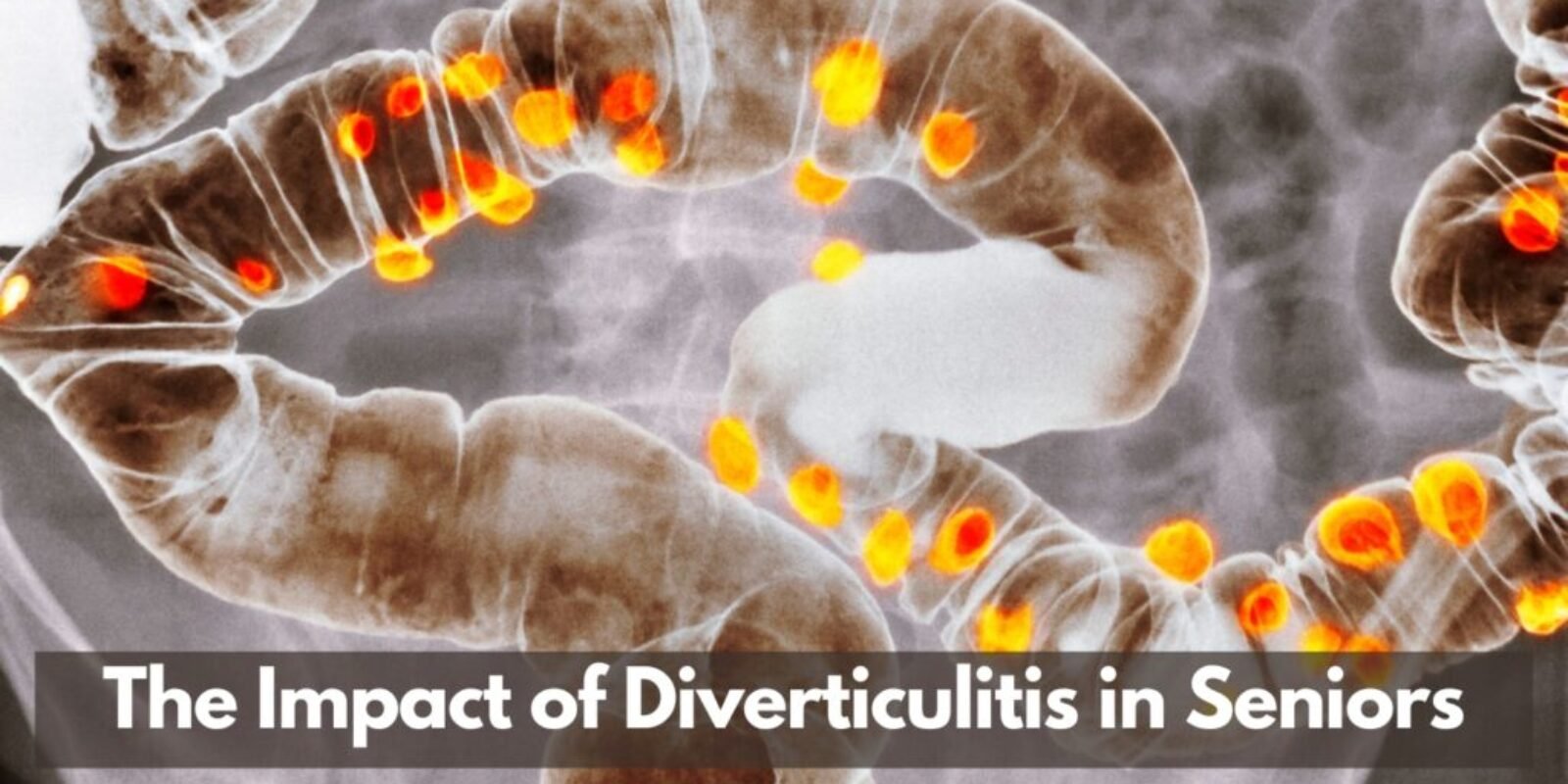Diverticulitis is a condition that can affect the digestive system, particularly as we age. It occurs when small pouches, called diverticula, form in the wall of the colon and become inflamed or infected.
While diverticulosis, the presence of these pouches, is common in people over 50, diverticulitis—when one or more of these pouches become irritated or infected—can lead to significant health concerns. Though many people may have diverticulosis without any issues, the risk of diverticulitis increases, especially in seniors.
What You Should Know About Diverticulitis?
In this blog post, we will talk about how diverticulitis affects the quality of life of older adults and look at the different ways it can be treated. We will also talk about possible changes in living and ways to deal with symptoms and improve their quality of life.
People with diverticulitis and the people who care for them can learn more about how to treat it by learning about the symptoms.
Prefer to listen rather than read?
What is Diverticulitis?
Diverticulitis is an inflammation of small pouches, known as diverticula, that can form in the wall of the large intestine. While the presence of these pouches, called diverticulosis, often doesn’t cause symptoms, their inflammation leads to diverticulitis.
This condition can manifest suddenly with symptoms such as abdominal pain, fever, nausea, diarrhea, or constipation. If left untreated, diverticulitis can result in serious health complications, including abscess formation, fistulas, or bowel perforation.

As people age, the muscles that tighten and move food through the digestive system may weaken. These things can cause pockets, or diverticula, to form in the lining of the bowels. Also, as we continue to age, the lining of our bowels gets weaker, and we are more likely to get infections, which raises the risk of getting diverticula even more.
The development of diverticula usually results from increased pressure in the colon, often from straining during bowel movements. While the exact reasons why some people with diverticula develop diverticulitis and others don’t remain unclear, certain lifestyle factors can increase the risk.
Several factors may increase the risk of developing diverticulitis, including obesity, lack of exercise, smoking, a family history of the disease, and the use of nonsteroidal anti-inflammatory drugs (NSAIDs). While a low-fiber diet has traditionally been considered a risk factor, recent studies have not confirmed this association.
The aging process can cause the body to produce fewer digestive enzymes, reducing its ability to break down food. The amount of helpful bacteria in the intestines also decreases, restricting the ability to digest food effectively. This can easily result in constipation and an accumulation of pressure in the intestines.
These issues can be unpleasant and uncomfortable, especially for seniors, but the good news is that you can take steps to help prevent diverticula and other digestive problems. Early detection and management of diverticulitis are crucial to prevent complications. Treatment options range from dietary changes and antibiotics to surgery, depending on severity. A healthy lifestyle with exercise and a fiber-rich diet can lower the risk of developing diverticulitis.

Diverticulitis in Senior Patients Frequently Gets Worse
Diverticulitis is a common digestive disorder among seniors, and its progression is known to worsen with age.
While there are medications and dietary changes that can alleviate symptoms, evidence suggests that diverticulitis can lead to a decrease in quality of life due to the associated pain and discomfort. Furthermore, in some cases, the condition may require surgery to remove the infected area of the large intestine – colectomy.
Poor quality of life in seniors causes limited mobility, anxiety, and depression, leading to health issues like diverticulitis that require careful monitoring by healthcare providers. Early detection and treatment are essential for maintaining seniors’ health and avoiding complications.
Complications that Arise from Diverticulitis
Diverticulitis can have particularly devastating effects on seniors, leading to a variety of complications that can significantly impact their quality of life. These complications can include severe abdominal pain and fistulas, as well as an increased risk of infection and abscess formation.
Complications of diverticulitis can be long-term, such as fistula formation, bowel obstruction, and chronic inflammation of the colon. Seniors are particularly at risk for these complications, given their weaker immune systems and longer recovery times.

Fistula is a rare but serious complication of diverticulitis and can be difficult to distinguish from other diseases. When a fistula forms, it is usually in the form of an abnormal connection between the intestine and another organ, such as the bladder or vagina.
This can lead to a variety of symptoms including abdominal pain and infection. There is also a high risk of developing an abdominal abscess, which is a painful collection of pus in the abdomen. The risk of severe bleeding is also present, as the fistula can cause bleeding from the intestines or other organs.
There is a risk of obstruction of the intestines, which can lead to a buildup of gas, fluid, and waste. All of these risks must be taken into account when diagnosing and treating diverticulitis. If left untreated, a particularly serious complication of diverticulitis is bowel perforation, which can prompt an emergency surgical procedure.
Other potential complications of diverticulitis include peritonitis. This is an infection of the abdominal cavity which can be caused by the leakage of bacteria from an inflamed diverticulum. Peritonitis can cause severe discomfort, digestive disturbances such as nausea, vomiting, diarrhea, and nutritional deficiencies due to the disruption of normal digestion.

Severe cases of peritonitis can be life-threatening and require immediate medical treatment. If left untreated, it can lead to sepsis or even organ failure. It is important to seek medical treatment as soon as you notice any signs or symptoms of diverticulitis to avoid serious complications.
Therefore, healthcare providers need to be aware of the potential risks associated with diverticulitis in seniors and take appropriate measures to reduce the risk of complications. Seniors are more likely to experience hospitalization and re-admission due to diverticulitis compared to other age groups. This is largely attributed to the higher prevalence of co-morbid conditions among the geriatric population, which can complicate the treatment of diverticulitis.
Co-morbid conditions, such as chronic kidney disease, congestive heart failure, and diabetes, can make it more difficult to address the root cause of the infection and can increase the risk of the infection spreading or becoming more severe.
Studies have also found that senior patients often require longer hospital stays and have higher mortality rates than other age groups when hospitalized due to diverticulitis. The aging process can also delay the healing process and increase the risk of complications.
Furthermore, diverticulitis patients often require more intensive medical and nursing care, leading to prolonged hospital stays nad increased healthcare costs. It is therefore important to recognize the potential increased risk of hospitalization and re-admission among geriatric patients with diverticulitis to develop strategies to reduce the burden and improve the quality of life of this population.
Common Symptoms of Diverticulitis
Diverticulitis may have a mysterious origin, but it’s thought that inflammation in the gut can be caused by waste material building up in certain areas. Seniors with diverticulitis may experience a range of symptoms including:
- Abdominal pain and tenderness
- The abdominal pain is usually localized in the left lower portion of the abdomen and can range from mild to severe. In addition, the pain may be accompanied by fever, nausea, vomiting, and constipation.
- Abdominal bloating
- Abdominal bloating is caused by the enlargement of the intestine due to inflammation and/or infection, leading to a feeling of fullness and discomfort. The inflammation of the colon can cause an increase in the production of gas, which further contributes to the feeling of bloating.

- Fever, chills, and night sweats
- Fever, chills, and night sweats are the body’s way of responding to inflammation and can be indicative of an infection.
- Nausea, vomiting, and diarrhea
- Seniors with diverticulitis often present with nausea, vomiting, and diarrhea as a result of complications from the condition.
- Blood in stool or black and tarry stools
- This is due to the inflammation of the diverticula, which causes bleeding, usually from the capillaries surrounding the diverticula. The bleeding can manifest in the stool as bright red blood or even black and tarry stools.
As the condition progresses, these pockets can become infected, resulting in further discomfort. It is important to note that these symptoms can vary in severity and may even be absent in some cases, making the diagnosis a difficult task.
Diagnosis of Diverticulitis in Senior Patients is Often Delayed
It has been widely documented that senior patients with diverticulitis often suffer a delayed diagnosis. This is primarily due to the fact that their symptoms are often subtle and difficult to detect. As a result, the condition can be mistakenly identified as a less serious health issue.
This can lead to the severity of the condition being underestimated and, in some cases, an inadequate or inappropriate treatment plan being prescribed. The lack of an early diagnosis can lead to a prolonged course of suffering and an increase in the risk of developing serious complications, such as peritonitis, abscesses, fistulas, and obstruction.
This delay in diagnosis can lead to increased suffering due to the advanced progression of the disease. With the disease allowed to progress and the original problem missed, the patient is exposed to more serious medical issues. This misdiagnosis can adversely affect the senior patient’s quality of life due to the additional health problems that occur due to the delay in diagnosis.
As the patient’s condition progresses, they will likely require more extensive and costly treatments. This can be a tremendous burden for the patient and their family, as it can result in significant financial stress in addition to the physical and mental strain placed on the patient.
The most common treatment for diverticulitis in senior patients is using antibiotics for a period of time to reduce inflammation and prevent the formation of abscesses. Non-steroidal anti-inflammatory drugs (NSAIDs) may be utilized as a means of reducing inflammation and providing symptomatic relief in patients with diverticulitis.

However, it is important to be aware of the associated risks before taking any NSAIDs, as tehy can potentially increase the risk of gastrointestinal bleeding. Those with pre-existing kidney or liver problems may be at a heightened risk of adverse reactions, and should always consult with their physician prior to beginning any medication regimen.
Furthermore, it is essential to understand the correct dosage and duration, as well as to monitor any potential side effects that may occur closely. With such considerations, NSAIDs can provide a safe and effective means of providing symptom relief in cases of diverticulitis.
Management of Diverticulitis
Treatment for diverticulitis varies depending on the severity of the condition. For mild cases, a combination of rest, a temporary liquid diet, antibiotics, and mild pain relievers can help manage symptoms. In more severe cases, hospitalization may be necessary, and intravenous antibiotics or even surgery could be required to address complications like ruptured intestines or abscesses.
In addition, medications can be used to reduce inflammation and help manage symptoms. Additionally, surgical treatments may be necessary for complications, such as perforated diverticulitis. Therefore, it is essential for healthcare providers to understand the medical and lifestyle management of diverticulitis in order to improve the quality of life for affected patients.
Dehydration is a direct consequence of diverticulitis, as the body often loses too much fluid due to inflammation and frequent diarrhea. Finally, depression is a common psychological symptom of any chronic illness, and seniors are particularly susceptible to the negative effects of depression.

Conclusion
To sum up, diverticulitis can significantly impact the quality of life of those affected. It is important to make sure that seniors are aware of the signs and symptoms of diverticulitis and seek medical advice immediately should they experience any of them.
Early diagnosis and treatment are key to improving the quality of life of those living with diverticulitis. You must seek medical advice if you are exhibiting any of the following symptoms. Remember, this post is for informational purposes only and is not a substitute for professional medical advice. If you or a loved one are experiencing symptoms, be sure to consult your healthcare provider.
Disclaimer
The content provided on MySeniors.World is for informational purposes only and is not intended as either financial or medical advice. Always consult a qualified professional before making any investment or health-related decisions.
Posts may contain affiliate links, meaning we earn a commission – at no additional cost to you, if you click through and make a purchase. Your support helps us continue providing valuable content.



















